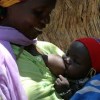Breast-feeding in 1991
Abstract
With increasing urbanization and greater entry of women into the workforce in both
undeveloped
and developed countries, it behooves physicians to remember that our encouragement of breast-feeding often conflicts with the practical imperatives faced by many young mothers. We should continue to encourage breast-feeding, but in individual instances this policy can safely be tempered with realism.… Read more

